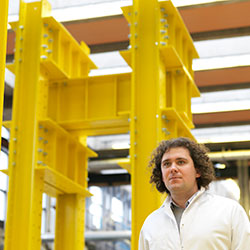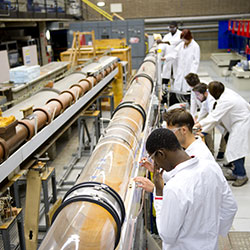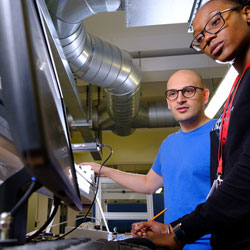What is your area of research?
In the Faculty of Engineering and Informatics, my research expertise is in the areas of sustainability assessment of the built environment with a focus on water and waste water infrastructure, buildings, transport infrastructure and noise reducing devices.
What influenced you to study and research in your field?
From an early age, I have always liked and been aware of the built environment, but the drawings of houses I created as a child clearly showed me that I did not have a flair for architecture. However, I was always attracted to physics, chemistry and mathematics, and achieved high grades in these subjects. This led me towards a profession with an emphasis on engineering and so with an interest in buildings and the environment, I decided that civil engineering would provide me with a fascinating and stimulating career.
After studying civil, industrial and agricultural construction engineering at university in Romania for five years, I gained practical experience over a period of three and a half years working for a major contractor on large construction projects, including a chemical engineering plant, in the roles of site manager, project manager, and site engineer. It was unusual for a professional woman civil engineer to perform in such roles. Typically, women then did not undertake site management activities because at that time women worked in an office and it was rare to see a woman at the heart of a major project. But I was prepared to take on the challenge and so I worked hard and grasped the opportunities to become a pioneer in what was and, still is, a male dominated profession.
After gaining practical and managerial experience on projects, I decided that a career in academia would enable me to share my experiences and knowledge with others, and I have been in an academic role ever since. I gained my first academic appointment in Romania, but over the years I have undertaken teaching and research in Germany, France and the UK. In 1994, whilst in England I applied for a lectureship in building surveying in Dundee, Scotland, but my concern was whether being Romanian, I would require a work permit and a visa for the interview. I was subsequently invited for an interview, and was successful in achieving my first academic appointment in the UK. In 2003, I was appointed a senior lecturer at the University of Bradford and in 2015 promoted to a Personal Chair in Sustainable Built Environment.
What inspires you to continue in your field?
Throughout my entire career I have always been research active. To me, it is impossible to contemplate being an effective academic and not to undertake research. My research activities underpin my teaching and in so doing I push the frontier of engineering knowledge. The concept of continual discovery and removing limiting beliefs and boundaries is crucial for the development of people in all walks of life, and particularly in the engineering profession. This is a whole life learning process, and in the academic role is centred on advancement and the transfer of knowledge – and this is what I particularly love about my role.
Engineering is a very creative and satisfying profession. Few professions give people the opportunity to design and /or build a structure, such as a tunnel, a bridge, a railway, a dam or a complex building structure, with the satisfaction of knowing it may stand and be in full use for a century or more.
As an academic with roles in teaching and research, I transfer what I know and have experienced to students of all ages and backgrounds, and from around the world. These students then create buildings and infrastructures to satisfy the needs of the built environment in their countries and this is highly motivating for me since the work they do has a huge impact on communities and society.
What would you say to young females to encourage them to progress into your field?
Reflecting on my early career, I can say that for a woman to become an engineer was difficult. However, there are still challenges that women face but, hopefully, increasingly more and more women will find that with determination, ambition and indeed stamina, highly qualified and professionally competent woman can achieve senior and exciting roles in engineering. But women must be encouraged to study science and mathematics from the age of 11 to provide them with the necessary grounding, and the time to take these subjects to an advanced level; it is too late for a student to start these subjects during the sixth form education.
When women, and men, realise how rewarding and satisfying a career in engineering is, it is important for them to follow role models from an early age. This is what I did, and throughout my life and particularly during my earlier life I was inspired to follow my dream of working on projects. And now, I am gratified by those men and women that chose engineering and I see them transferring their skills and knowledge, to which I sometimes contributed, on projects that will serve the needs of the next generation.
Interestingly…
I believe that one of the most important aspects of engineering is the satisfaction that can be gained and knowing that you have contributed to the creation of something that impacts the lives of others. Coupled with this is the fact that engineering and academia
is continually changing - new technologies are developed, new construction methods are introduced, and materials are discovered, and these can change our methods of construction. But through all of these changes, the engineering principles remain the same.
The advent of the digital world helps us to rapidly explore alternative engineering design and manufacturing systems in an increasingly environmentally-conscious way. It is crucial that as we create new structures, and undertake repairs to existing ones, the environmental protection of our planet and the consideration of sustainable development and the impact of climate change, are of paramount importance.
It is engineers that have always been at the forefront of change over many centuries and this will continue to be so in the foreseeable future. There are wonderful opportunities waiting for engineers to serve the future needs of society, and women should strive to take a major lead in this role, and when they do they will soon realise what an exciting and stimulating career is open to them.
More about Professor Crina Oltean-Dumbrava
Prof Crina Oltean-Dumbrava is an international academic with over 43 years’ professional experience of which 40 years have been in academia with teaching and research experience in the UK, France, Germany, Italy, Greece and Romania. She has masters’ qualifications in civil and building engineering, and economics, and is a Fellow of ICE, a chartered civil engineer, a chartered builder, a charter construction manager and a chartered surveyor.
Prof Oltean-Dumbrava is a member of the JBM Visiting Accreditation Panel and a member of the Education for the Built Environment (E4BE) Group, a partnership between the Construction Industry Council and the Construction Industry Training Board. She is a Past Chair of the UK’s Association of Civil Engineering Departments. At the University of Bradford she is a past member of University’s Council, Senate and Past Chair of the Standing Committee of the University’s Assembly. She is a member of the University Court.
Prof Oltean-Dumbrava has been research active for 40 years, has authored/contributed to 17 books, published over 1200 papers, and is or has been Principal Investigator, Co-Investigator or Collaborator of 42 research and teaching grants worth over £11m. She has been leading multi-national research projects and contributing to course development in several countries.
She was appointed the BSI (UK) expert, ISO and European Committee for Standardisation Road Traffic Noise Reducing Devices (RTNRD) CEN/TC 226, the CEN/TC 226/WG6 TG4 Convenor and Co-Convenor to implement sustainability in RTNRD standards and the Liaison officer between CEN/TC 226 and CEN/TC 350 Sustainability of Construction Works. She is Visiting Professor of the Technical University, Cluj-Napoca, Romania, an External Expert Evaluator for the Italian Ministry of Universities and Research, EU Horizon 2020 Programmes, and for the Romanian Agency for Quality Assurance in Higher Education. In 2017, as part of a team of five,
she was awarded the Vice--Chancellor’s Award for Outstanding Achievement for her contribution to the EU FP7 GENOVATE Grant.
She is proud of being invited in 2017as a Partner and Expert of the United Nations Sustainable Buildings and Construction (SBC) Programme of the 10--Year Framework of Programmes on Sustainable Consumption and Production (10YFP). In 2019 she has been nominated by BSI for one of the prestigious BSI Standards Makers Awards for Representing the UK and leading the development of the first European product sustainability standard: Road Traffic Noise Reducing Devices - Sustainability: Key Sustainability Performance Indicators (KSPI) Declaration.
View full profile of
Professor Crina Oltean-Dumbrava




























